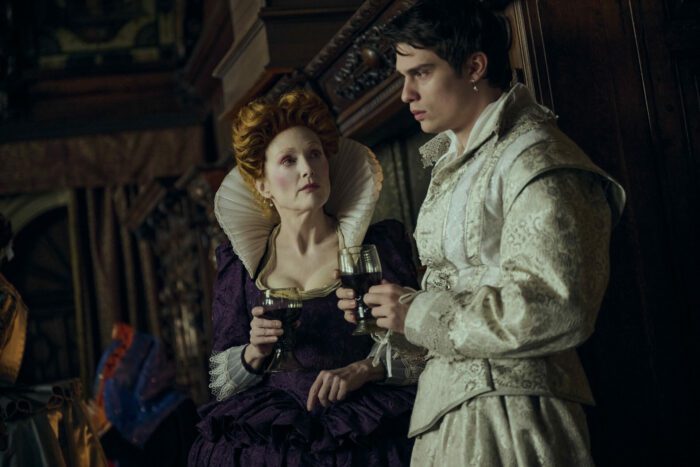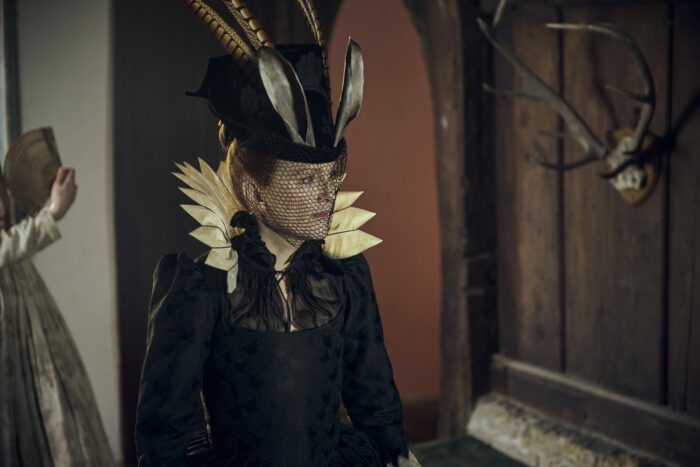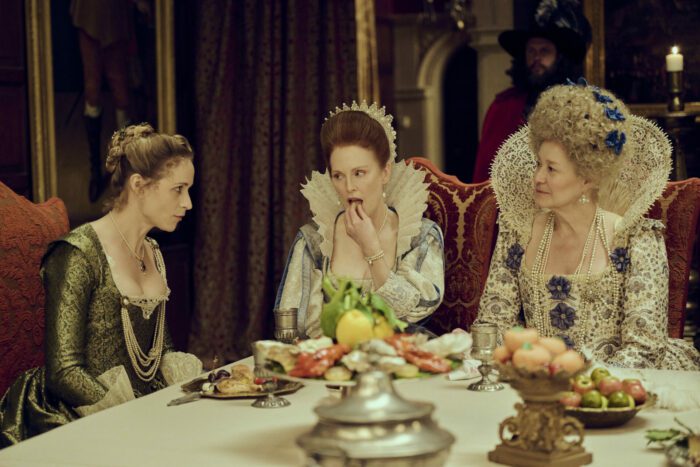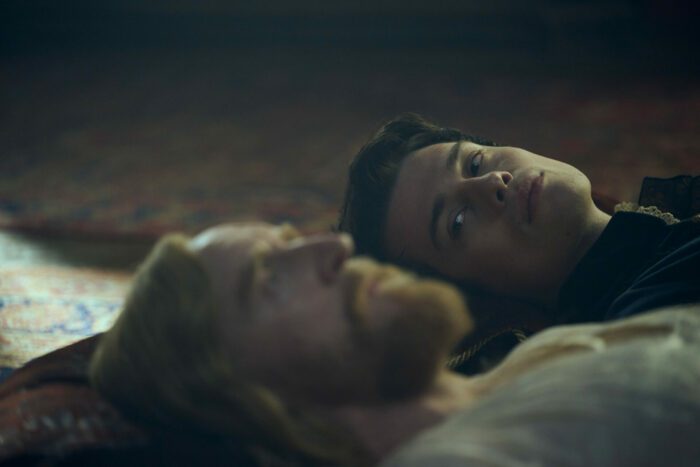This queer little period drama is inspired by the very true story of James VI and his notorious lover George Villiers, First Duke of Buckingham’s rise to power in the king’s court. A combined effort between Sky and Starz, Mary & George spans seven dramatic episodes filled with sex, grit, blood and deception.
Airing first on Sky in the UK and now on Starz in the US, Mary & George captures those thirsty for the queer history revisionists have starved us of. Created by D. C. Moore and directed by Oliver Hermanus, Alex Winckler and Florian Cossen, the dramatization is based on Benjamin Woolley’s non-fiction book The King’s Assassin (2017), which examines the history between George Villiers, First Duke of Buckingham and James VI.

However, the relationship between George Villiers (Nicholas Galitzine) and his mother, Mary Villiers (Julianne Moore), Countess of Buckingham, takes center stage in this mini-series. There lies a fascinating dissection of a manipulative bond between mother and son. Both performances stand alone boldly, but together, they shine, creating an immense fascination with nature versus nurture. Yet, it is also humorous how the mother scolds her boy into submission and then witnesses the childish rebellion that follows.
From May December to Mary & George, Julianne Moore is in her villain era. I love seeing this marvellous actress be domineering and coy; she has an unignorable presence. I’d also go as far as to say that her performances have shy elements of camp theatrics that allow for levity in her ridiculously ambitious schemes.

As the union between George Villiers and King James VI (Tony Curran) develops through the series, the politics of the time seep into an already complex relationship. We end up watching a sharp and compelling dramatization of what may have taken place behind closed doors of very true events: allegiances formed and broken, humiliations whispered of, affairs had and lost, and so much more.
Nicholas Galitzine’s George is a predator of pleasure in his escalation to power and persuasion. He makes many mistakes in his time beside the king, trying to protect his position and his family. It is fun to watch a man flounder in a political landscape he barely understands, especially while having access to the accurate histories of what events do eventually take place.
Mary & George is an insatiable joy to watch. In a more straightforward form, it is a show about a bunch of arrogant white queer people making decisions that impact far more people than they realize. It’s fun to watch the complicated ambitions of these characters unravel onscreen in a mess that is somehow called the History of Britain. For so long, you think of the head of an empire as dangerous and something to be feared, yet these people who rule are just squabbling fools.
The most confident is Mary Villiers, which may also be accurate to real life. This makes for a very modern story about a mother’s ambition and outright control of every decision made for her family. It’s a nuanced struggle for power between the mother and son, the apple and its tree.

The tale begins with George Villiers’ unconventional education in France as his mother remarries to elevate her station in England. Contrary to the pressures on George, he was merely the second son. The first, John Villiers (Tom Victor), is portrayed as unwell, unhinged, and mentally ill—the same is said in the history books. The two other children of Mary Villiers are much like their mother and brother in how they manipulate and connive to get what they desire.
Having discovered his untameable desire to be with both women and men in France, George Villiers is set on securing the king’s attention as instructed by his mother, following his unconventional education. This becomes a struggle as James VI is notorious for his dalliances with men, and gaining His Highness’s attention is a hobby for nearly every semi-attractive twink in the kingdom. However, with the help of Mary Villiers’ scheming, George is given his audience and slips into the crowd of royal groupies.

As Mary & George progresses, we see the great lengths taken to secure a guaranteed spot in King James VI’s bed chamber and how much more it takes to keep that spot. As far as I can tell, showrunner D.C. Moore took very few liberties with the history from Benjamin Woolley’s book. This goes to show just how unhinged and queer the period was with how openly the king took male lovers and how many more men in power did the same. It screams to its audiences that the LGBTQ+ community is nothing new; they have always existed, both exiled, hidden, and openly prowling the offices of power.
It is also refreshing to watch a series take a nuanced stance on queerness and show the distressing existence of evil that plagues a rather large community, as it does within the heterosexual community, but without insinuating that the queerness is correlated, if not the direct reason for the cruelty in these characters. It is one thing to show how any person can be cruel no matter their sexuality than to adamantly showcase villains queer-coded as though queerness is the cause of their evil deeds. I admire how we’ve moved forward as a society by seeing through these binaries and catching light of the nuances within marginalized communities.

